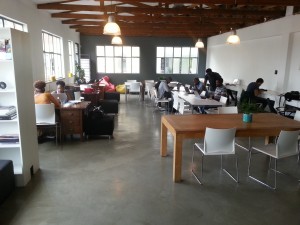Being involved in the World Summit on Information Society since 2000, we believe that there is a paradigm shift that is happening in the society and economy; a new economy is emerging that gives windows of opportunity for Africa. But nonetheless, humanity is facing unique economic, social and environmental challenges. We know that we need to change behaviours and innovate to find new ways of living in a more sustainable and more shared prosperity.
We believe that entrepreneurs are those who have the creative mind to imagine that future and make it happen. We need a new kind of entrepreneurs: more collaborative and involved in the community. That’s why we have built a home for them: Jokkolabs, inspired by the open source/hacker movement.
In 2010, I decided to dedicate my time and resources to launch Jokkolabs as a social change hub. The first hub was launched on 10/10/10 !
Our vision is to pioneer a new model of business, entrepreneurs based, supported by the emergent digital economy.
Nowadays, Jokkolabs is a network of 8 hubs in 8 countries*. Thanks to our hub leads, who are entrepreneurs aiming to engage with the community around them. Jokkolabs is now close to what we envisioned in the beginning : to be a collaborative ecosystem around creative hubs, where like-minded people drive entrepreneurial innovation and social change for a shared prosperity.
For example, more than just having a coworking, we help to structure communities aligned with our vision of openness and sharing, open source and tech communities (Mozilla, Google, Mobile Monday, etc.) as well as green economy friendly. In France, it’s an opensource software company Maarch, who supports the hub in the Paris suburb of Nanterre – La Defense. Depending on the level of maturity we also run pioneer project involving a community and technology driven approach such as:
Those projects are not usually happening in a lot of coworking spaces. In addition, we also have regular programmes, such as the Global Entrepreneurship Week.
We have a strong digital culture, as it’s the basement of the new economy. But we are open to all industries. Nowadays, our creative hubs are rather designed for creative talents working in mobility. However, we are thinking of a model for rural areas, around agriculture topics.
What is specific to run a coworking space in Africa and what are your main challenges ?
The private sector and the culture of entrepreneurship is very new in Africa. A challenging environment and a small economy make the business very difficult for our members. They can’t usually afford the real cost of the hub. Therefore, we have to be very innovative to find a sustainable business models. Nonetheless, we get no support at all from the government.
When we opened in France, we received a grant. It was so new to us that we haven’t been able to spend more than 50% of the amount…
There is a new starting wave, with more mature networks and initiatives. We need to find a way to go beyond our “egosystem” to really create a sustainable ecosystem within the continent and, even, on a more international level. We are open to collaboration with all those whose share the same vision of openness and collaboration. Those who wants to build a better world for a shared prosperity.
We believe in a very open partnership and in the principles of creating value together for the society.
In 2010 we were just 3 on the continent, out of 700 worldwide. Today we count at least more than 50 spaces like ours, I think. New spaces open everywhere, every month. That’s a good news, something is happening, that’s for sure. Over 5 years time, I see more and more spaces covering the continent, as well as more mature spaces, with a higher commercial and societal impact. As the level of intra-Africa trade is lower than 25%, I believe that all those spaces will connect the entrepreneurs of the continent with the world, serving as a catalyst for a sustainable and inclusive economic growth of Africa.
* France, Senegal, Mali, Benin, Burkina Faso, Ivoiry Coast, Gambia, and Marocco.

Indy Hall is a coworking community in Philadelphia, Pennsylvania, USA that we started in 2006. That makes us one of the longest-running spaces in the world.
If we’re “famous” for anything, it’s our relentless focus on community. At the heart of Indy Hall, you’ll find great people having authentic and meaningful experiences. We are living – and working – the good life.
We believe in sharing the good life & actively working towards it together.
I started Indy Hall because I was lonely. I didn’t so much need a place to work as I needed people to work around.
I’d quit my job as a web developer to freelance, and found that freedom and flexibility of being independent was awesome but DAMN it was lonely.
It seemed easier to find like-minded people anywhere except in my own city. So I spent nearly a year looking for those people. As I found them – I realized that many of us had the same problem in that it was difficult to find other people who had the same interests and passions we did.
By the time we were actually considering opening a coworking space, it was less like opening an office and more like building a village. The community we’d already built was invested in having a place to gather and work and meet and learn and explore.
I didn’t start Indy Hall for the community, I started it with the community.
One of the worst things I could do is show up in Africa and say “Here’s how we built our coworking space in Philadelphia. Do it our way!”
Coworking is an incredibly local experience. Indy Hall’s experience is the way that it is because we started in Philadelphia. The city’s local culture and DNA is baked in. I think that’s what makes us, us.
When I see new coworking spaces simply copying what they see in other coworking spaces from different places, I know they’re setting themselves up for failure. This happens very often in the US, and I’m seeing it more and more around the world as people try to copy the “visible” elements without understanding why they’re there in the first place.
I’m most excited for two things about coworking in Africa: the first is to discover the differences in our cultures that will make coworking in Africa unique. But the second is to discover the similarities, the basic human elements that we all share.
I’m coming to share, but I’m also coming to learn.
My personal philosophy on collaborations is also at the heart of Indy Hall’s success: true collaborations start on the foundation of a trusting relationship, not a transaction. Said more simply, we need to get to know each other before we work together.
So right now, I think we need to focus on truly getting to know each other. And then…the kinds of international collaborations that people crave will become not only more possible, but natural and effortless.
Over the last year, more of the people who join my list Coworking Weekly have introduced themselves from somewhere in Africa. It has been amazing, and exciting, to meet them and learn what’s happening in their cities, towns, and villages.
Villages. I want to know what coworking in villages is like!
This is a pioneering conference for a region. Not just a region, but an entire continent. That’s incredible, and I’m honored to be able to be a part of it.
Every time I’ve been to an event like this, I’ve gotten to see people who never would’ve otherwise found each other meet for the first time. That experience is truly magical, to find your tribe. It’s the same kind of thing that a great coworking experience can provide…except compressed into a couple of days full of gathering and working and meeting and learning and exploring.

Coworking Africa conference is the first attempt bringing together more than 20 countries from Africa and beyond: Senegal, South Africa, Mali, Democratic Republic of Congo, Burkina Faso, Rwanda, Maroc, Gambia, Benin, Mozambique, Ivory Coast, Egypt, Congo, Tunisia, Bangladesh, Philadelphia (US), Spain (EU), The Netherlands (EU), Austria (EU) and Belgium (EU).
A unique opportunity to share and learn best practices, knowledge, success and failures experiences about coworking. You are also welcome to bring your story too.
Be one of the first people to take part of the coworking movement in Africa, the continent with the youngest population and with the highest potential in the world.
The pioneers from the African coworking scene will meet up in Cape Town next July 23-24.
Start to collaborate. Joining forces with other coworking spaces will make you stronger towards other players such as local institutions, sponsors and potential customers elsewhere in Africa or in the world. Build together a conversation and a network of trust between other coworking communities, it benefits everybody.
Who’s coming to Coworking Africa conference ? Coworking space managers, incubators managers, startup accelerators managers, business centers managers, real estate pundits, innovation ecosystem specialists, economic development public agencies, entrepreneurship associations, universities, business schools and journalists.
The conference is a unique occasion to connect with the best experts from the coworking world. Meet them and start interesting relationships, and, why not, build up and collaborate on new exciting projects.
Coworking is about people!
Cape Town is one of the cities leading the coworking movement in Africa with about 20 coworking spaces. Once you’ll be in Cape Town don’t miss hotspots such as Workshop17, Daddy.O, Garage, Twenty-Fifty, Cape Town Office, the Design Bank or The Barn… to mention a few.
Coworking Africa conference is more than a conference. We love coworking as much as having fun.
Today, the US based New Worker Magazine posted a great article on our upcoming Coworking Africa conference in Cape Town. 
Until now Africa has been considered a small player in the coworking movement. Now, major demographic shifts and a handful of booming tech scenes are creating ideal conditions for the rise of coworking in Africa. A growing number of people across Africa are looking for flexible workspace, from entrepreneurs and independent tech professionals, to teachers and development workers.
Over 100 coworking spaces, tech hubs, business incubators and startup accelerators have opened in Africa in the last two years. Universities, businesses and development agencies are starting to make use of these new spaces.
With the growth of the flexible workspace industry comes Africa’s first conference devoted to the topic. The Coworking Africa conference will be held in Cape Town, South Africa on July 23-24 at Cape Town Office,Cape Town Garage, OPEN and The Design Bank. Cape Town is regarded as the capital of coworking in Africa with more than 25 spaces, many of which will be participating.
You can read the whole piece here
Iceaddis is the first innovation hub & coworking space in Ethiopia established in May 2011. The coworking space recently moved to a new modern building in the heart of Addis Ababa.
Iceaddis is partly an open community workspace, part vector for investors and part pre-incubator for young energetic tech- entrepreneurs.
We asked Florian Manderscheid, the development manager, to tell us more about Iceaddis.
What is Ice Addis ?
Iceaddis is an innovation hub and coworking space. We support startups teams and host events for tech community and social focus.
What can you tell us about your story ? Your focus ?
Iceaddis was established as the first innovation hub in Ethiopia, it serves as a place to go for young creative professionals with a background of an growing economy and changing structures in the society. iceaddis is offering a place for exchange, work and the support for innovative project ideas, that are related to local demands and developments. Mainly young university graduates and startup founders are using the iceaddis facilities and connect to the developer and technology community.
Looking back on several startups that have came out of iceaddis and a community with around 5000 members, we have currently changed our organization in to a private company that enables us to reach out to even more young talented techies and entrepreneurs. We believe that iceaddis has become more attractive to collaborate with private sector and international institutions.
How would you describe the situation of coworking in Ethiopia ? Where does the demand come from ? Is your community mainly made out of freelancers, startups, NGO’s ?
As coworking is now in the beginning in Ethiopia, we see a huge potential for more places, such as iceaddis. So far, there are very few other public coworking spaces and the concept of coworking is very new to most of the professionals and corporates. Most of our community members have a tech related background but also international freelancer are part of the mix.
Is this audience big enough, according to you, to make those spaces financially sustainable on the long run ?
That is something, we are eager to figure out within 2015, since we just started giving service.
What are the biggest challenges you have to face ?
Apart from the financial sector that makes it complicated for startup investment, it is the bureaucracy which makes it necessary, to have a business license for each activity that we want to perform i.e. consultancy, coworking, events, product development. But we are very optimistic that the government will change the regulations and include startup incubation in the business licensing.
According to you, offers coworking a solution to offer a better, more reliable, internet broadband connection for a bigger audience in Africa ? What about power outages ?
Internet is available for many people by service providers, such as internet cafés and hotels. But coworking offers a lot more than internet, which is the exchange amongst young entrepreneurs and techies – that enables them to focus on even more complex challenges.
What can you tell us about the ambitions of Ethiopia in terms of digital entrepreneurship friendliness ?
So far, we see a change in digital entrepreneurship and a growing number of startups involved in the sector. Currently the potential is limited due to an inefficient financial sector, but we are waiting for mobile payment systems to be launched by end of this year. On the other side Ethio Telecom has a lot of homework to improve the stability of internet connection.
Do you thinks coworking spaces community in Africa should/could collaborate more ? If yes, in which fields ?
Probably coworking spaces can be a link for peer learning and knowledge sharing.
We are very happy to welcome Phezulu Group as a sponsor of the Coworking Africa 2015 conference !
Only one week left to get your Coworking Africa conference Early Bird ticket. The opportunity will be over after April 15th.
Get the Early Bird discount here.
More than 5.500 coworking spaces operate worldwide. Now, the coworking wave has hit Africa. From flex office providers, open incubators or tech hubs providing with a coworking offering are blossoming across the continent. For the first time, the African coworking community is invited to gather in Cape Town, on July 23th and 24th 2015.
We’ll enjoy two days of collective learning, inspiring content & serendipity.
Insightful keynotes and panel discussions on the latest trends and inspiring stories from the Coworking community from Africa and beyond.
Networking cocktail at The Design Bank coworking space.
A whole day of barcamp which attendees choose and facilitate participatory workshops to celebrate collaboration and to share best practices. We will make sure there will be even more collaboration, interactions and meaningful encounters this year.
At the end of the Barcamp/Unconference, on the second day, groups will leave for a guided tour of the Cape Town Coworking scene, across the city. The tour will end at the cocktail/party venue.
Closing party at Cape Town Garage coworking space.
Be a part of the first Coworking Africa Conference !
Available only until April 15th
Get a discount on the regular price !
La conférence Coworking Africa, le 1er événement organisé en Afrique sur la thématique du coworking, se tiendra au Cap, en Afrique du Sud, les 23 et 24 juillet 2015. 
Le coworking est un concept d’espace de travail mutualisé qui monte en puissance partout dans le monde. Plutôt que de payer un loyer, comme dans un bureau classique, les utilisateurs paient un abonnement correspondant à la durée d’utilisation de l’espace.
Le modèle est particulièrement adapté pour les travailleurs indépendants, les entrepreneurs et les startups qui peuvent ainsi partager les coûts d’accès à une infrastructure de qualité, dans laquelle ils ont accès une connexion internet partagée.
Grâce à la mise en commun de l’infrastructure, les espaces de coworking deviennent le lieu de fixation de communautés dynamiques d’entrepreneurs et de travailleurs qualifiés. Désormais, beaucoup hébergent des programmes d’accélération de startups et structurent les écosystèmes créatifs dans les villes ou régions où ils se trouvent.
L’Afrique prête pour un essor rapide du coworking 
Plus de 5.800 espaces de coworking sont aujourd’hui recensés dans le monde. Le nombre double chaque année.
Si l’Europe et les Etats-Unis sont à ce jour leaders, le coworking connaît aujourd’hui un essor rapide en Afrique également. Cette évolution est alimentée, entre autres, par le développement récent de communautés d’entrepreneurs digitaux dans de nombreux pays africains, par l’amélioration progressive de l’accès à internet haut débit ou encore par la croissance démographique qui fait de l’Afrique la population la plus jeune du globe. Partout, les espaces de coworking deviennent les lieux privilégiés d’où démarrent la plupart des nouveaux projets de startups. L’Afrique ne fait pas exception.
La conférence Coworking Africa 2015 entend réunir plus d’une centaine de participants d’Afrique et d’ailleurs.
La première conférence africaine sur le Coworking, vise à créer des liens et des échanges entre opérateurs d’espaces. Coworking Africa 2015 s’adresse aux gestionnaires d’espaces de coworking, aux porteurs de projets d’espace de coworking, mais aussi aux représentants d’organisations publiques, aux gestionnaires d’incubateurs d’innovation, de programmes de mentorat, d’accélération de startups, aux organisation non gouvernementales, aux fondations, ou encore aux entreprises liées ou pas aux mondes digitaux…
Les organisateurs de cette première conférence africaine sur le coworking ont l’espoir que l’initiative tissera des premiers liens durables entre les opérateurs d’espaces de coworking africains et qu’elle fera connaître l’impact positif que le développement de l’offre coworking peut avoir en l’Afrique. La conférence a aussi pour objectif de faire apparaître la communauté coworking d’Afrique sur la carte du coworking au niveau mondial
Plus de détails sur le programme et les orateurs : www.coworkignafrica.com
Organisation :
Coworking Africa 2015 est le fruit d’un partenariat entre Global Enterprise et Cape Town Office.
Global Enterprise est l’initiateur de la conférence Coworking Europe conference. La dernière édition, tenue à Lisbonne, avait réunii plus de 320 participants issus de 40 pays différents. Coworking Europe collabore étroitement avec GCUC, organisateur de la conférence américaine sur le coworking, et associés aux événements similaires en Australie et au Canada.
Cape Town Office, fondé par Lizelle van Rhyn, est l’un des pionniers du coworking en Afrique du Sud. L’espace est située au Cap.
Lieu et dates:
23 et 24 juillet 2015
East Studio (62 Roeland Street. Le Cap, Afrique du Sud)
Inscription :
http://coworkingafrica.com/book-now/
Accreditation média : vanessa@coworkingafrica.com
Suivez-nous sur les réseaux sociaux:
https://www.facebook.com/CoworkingAfrica
Twitter : @CoworkingAfrica
Contact :
Jean-Yves Huwart Vanessa Sans Lizelle Van Rhyn (au Cap)
jy.@coworkingafrica.com vanessa@coworkingafrica.com lizelle@capetownoffice.com
T
[1] Deskmag Global Coworking Survey 2014
Jon Stever is the Founder of The Office, a community workspace and hub of hubs that hosts and connects the grassroots innovation and entrepreneurial ecosystem in Kigali, Rwanda. 